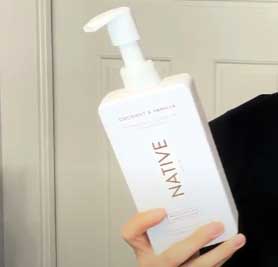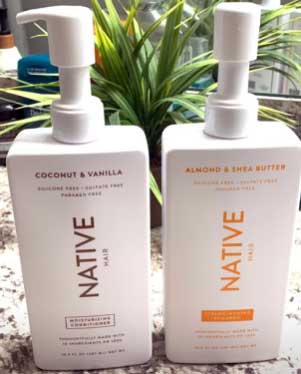If you’ve ever dealt with dandruff, you know how frustrating and embarrassing it can be. Those pesky white flakes on your shoulders can make you feel self-conscious and uncomfortable.
You might have tried countless shampoos and treatments, but have you ever wondered if a native shampoo could be the solution you’ve been looking for?
Today, we’re going to explore whether native shampoo can help with dandruff, and by the end of this article, you’ll have a better understanding of what might work best for you.
Understanding Dandruff

Before we get into whether native shampoo can help with dandruff, it’s important to understand what dandruff is and what causes it.
Dandruff is a common scalp condition that causes flakes of skin to appear. It’s often accompanied by itching and irritation. The primary causes of dandruff include:
- Dry Skin: When your scalp is dry, it can lead to flaking and itching.
- Oily Skin: An oily scalp can lead to an overgrowth of a yeast-like fungus called Malassezia, which can cause dandruff.
- Sensitivity to Hair Products: Some people are sensitive to certain ingredients in hair care products, which can lead to scalp irritation and dandruff.
- Skin Conditions: Conditions like psoriasis and eczema can also cause dandruff.
Ingredients In Native Shampoo That Help With Dandruff
Now that we have a basic understanding of dandruff, let’s talk about how native shampoos can help. The key lies in the ingredients. Here are some common natural ingredients found in native shampoos that are known to help with dandruff:
- Tea Tree Oil
Tea tree oil is a powerful antifungal and antibacterial agent. It can help reduce the growth of the fungus that causes dandruff, soothe irritation, and reduce itching. Using a shampoo with tea tree oil can help keep your scalp healthy and dandruff-free.
- Aloe Vera
Aloe vera is known for its soothing and moisturizing properties. It can help calm an irritated scalp and reduce the itching and flaking associated with dandruff. Aloe vera also has antifungal properties, making it a great ingredient for fighting dandruff.
- Apple Cider Vinegar
Apple cider vinegar is known for its ability to balance the pH of your scalp. A balanced pH can help reduce the growth of dandruff-causing yeast. It also helps to exfoliate the scalp, removing dead skin cells and reducing flakes.
- Coconut Oil
Coconut oil is highly moisturizing and can help combat dryness, one of the main causes of dandruff. It also has antifungal properties, which can help reduce the growth of Malassezia on the scalp.
- Peppermint Oil
Peppermint oil has a cooling effect that can help soothe an itchy scalp. It also has antimicrobial properties that can help keep your scalp healthy and free from dandruff.
- Neem Oil
Neem oil has been used for centuries in traditional medicine for its antifungal and antibacterial properties. It can help reduce the growth of dandruff-causing fungi and soothe an irritated scalp.
How To Choose The Right Native Shampoo For Dandruff?
When you’re on the hunt for a native shampoo to help with dandruff, there are a few things to keep in mind:
- Read the Ingredients List

Make sure to read the ingredients list carefully.
Look for natural ingredients known for their dandruff-fighting properties, like tea tree oil, aloe vera, and coconut oil.
Avoid shampoos with harsh chemicals, sulfates, and synthetic fragrances, as these can irritate your scalp and worsen dandruff.
- Consider Your Hair Type
Different hair types have different needs.
If you have dry hair, look for a moisturizing shampoo with ingredients like coconut oil and aloe vera. If you have oily hair, a clarifying shampoo with apple cider vinegar might be a better choice.
- Check for Certifications
Look for certifications that indicate the shampoo is made with natural and organic ingredients. Certifications from organizations like USDA Organic or Ecocert can give you confidence that the product is truly natural.
- Test It Out
Everyone’s scalp is different, so what works for one person might not work for another. Don’t be afraid to try a few different native shampoos to see which one works best for you. Give each shampoo a few weeks to see how your scalp responds.
Native Shampoo Vs. Commercial Anti-Dandruff Shampoo
You might be wondering how native shampoos stack up against commercial anti-dandruff shampoos. Here’s a quick comparison:
- Ingredients
Native shampoos use natural ingredients, while commercial anti-dandruff shampoos often rely on chemical ingredients like zinc pyrithione, selenium sulfide, and coal tar. While these ingredients can be effective, they can also be harsh on your scalp and hair.
- Side Effects
Commercial anti-dandruff shampoos can cause side effects like dryness, irritation, and even hair loss in some cases. Native shampoos, on the other hand, are gentler on your scalp and less likely to cause side effects.
- Long-Term Use
Using commercial anti-dandruff shampoos for a long time can sometimes lead to resistance, where the dandruff no longer responds to the treatment. Native shampoos, with their natural ingredients, are less likely to cause this issue.
- Environmental Impact
Native shampoos are often more environmentally friendly, using biodegradable ingredients and sustainable packaging. Commercial shampoos, with their synthetic ingredients and plastic packaging, can have a bigger environmental footprint.
Tips For Using Native Shampoo For Dandruff
To get the best results from your native shampoo, here are a few tips to keep in mind:
- Use Regularly

Consistency is key when it comes to treating dandruff.
Use your native shampoo regularly, according to the instructions on the bottle.
It might take a few weeks to see noticeable results, so be patient.
- Massage Your Scalp
When you apply the shampoo, take the time to massage your scalp.
This helps to improve circulation, remove dead skin cells, and ensure the shampoo reaches your scalp properly.
- Follow Up with a Conditioner
Using a conditioner can help keep your hair and scalp moisturized. Look for a natural conditioner that complements your shampoo and contains soothing ingredients like aloe vera or coconut oil.
- Avoid Heat Styling
Heat styling tools can dry out your scalp and worsen dandruff. Try to limit your use of blow dryers, curling irons, and straighteners, or use them on a low heat setting.
- Stay Hydrated
Drinking plenty of water helps to keep your skin, including your scalp, hydrated. Make sure you’re drinking enough water throughout the day to support a healthy scalp.
Wrapping Up
So, does native shampoo help with dandruff?
The answer is a resounding yes! Native shampoos, with their natural, gentle ingredients, can be an effective solution for managing dandruff.
By using ingredients like tea tree oil, aloe vera, and coconut oil, native shampoos can help soothe an irritated scalp, reduce the growth of dandruff-causing fungi, and keep your hair and scalp healthy.
Remember, finding the right shampoo for you might take some trial and error, but with a bit of patience and consistency, you can find a solution that works.
Give native shampoo a try and see if it’s the answer to your dandruff troubles. Here’s to a healthier, flake-free scalp and feeling confident and comfortable in your own skin!
